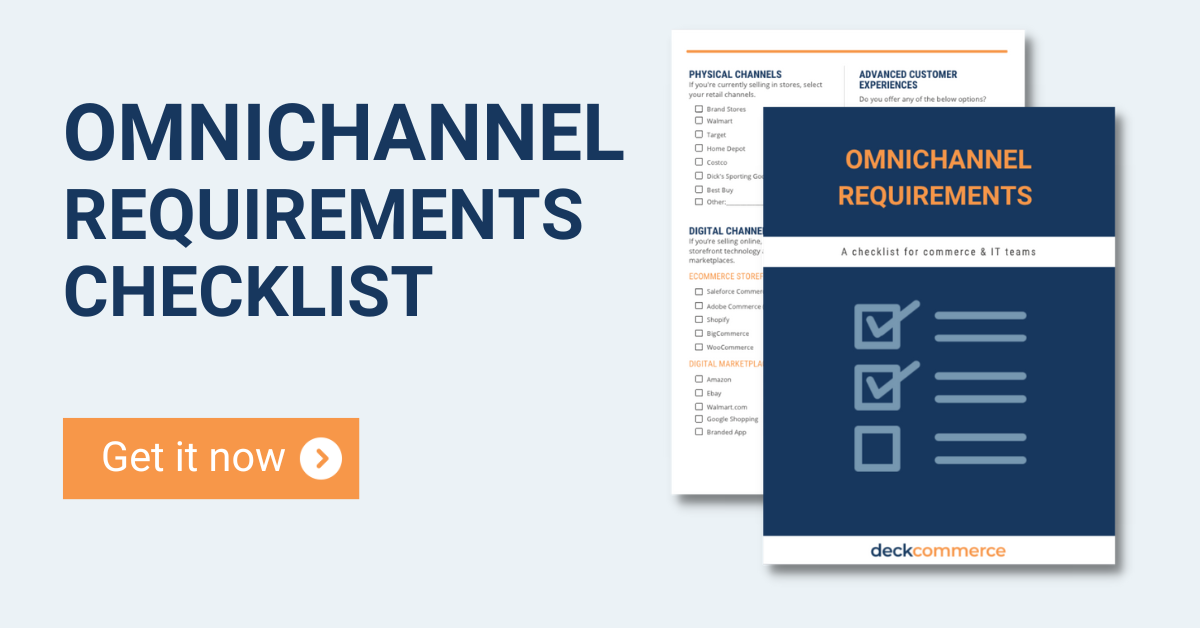Best Practices & Tech Solutions for Multi-Channel Fulfillment

Gone are the days when businesses relied solely on a brick-and-mortar presence to drive sales. Today, success in retail hinges on embracing multi-channel fulfillment strategies.
In this blog, we’ll explore the nuances of multi-channel fulfillment, the common challenges retailers encounter, and the powerful technology solutions that alleviate these pain points.
Read on as we uncover the best practices and technology solutions for mastering the art of multi-channel fulfillment.
What is Multichannel Fulfillment?
-png-1.png?width=550&height=225&name=Multichannel%20Merchant%20Jan%2021%20Ad%20(2)-png-1.png)
Multi-channel fulfillment is a comprehensive retail strategy that sells products through various online and offline sales channels. These sales channels include e-commerce storefronts, mobile apps, marketplaces like Amazon and eBay, physical retail stores, and social media platforms.
The essence of multi-channel fulfillment lies in providing customers with multiple touchpoints to discover, purchase, and receive products, catering to their diverse shopping preferences.
In this strategy, a retailer seamlessly integrates all these channels into a unified system, allowing customers to shop, place orders, and receive products regardless of their chosen platform.
This approach transforms a retailer's operations into a cohesive and customer-centric ecosystem, where inventory, orders, and customer data flow seamlessly across all touchpoints.
Multi-channel fulfillment aims to provide customers with a consistent and convenient shopping experience, regardless of whether they prefer to shop online, visit a physical store, or explore various marketplaces.
Common Challenges in Multi-Channel Retail Operations

Challenge |
Impact on Retailers |
|
Inventory Management Complexity |
Managing inventory across multiple sales channels can be a logistical nightmare. Retailers must ensure that products are in stock and available for purchase on every platform. Overcommitting or understocking can lead to lost sales or excess carrying costs. |
|
Order Processing Variability |
Each sales channel may have unique order processing requirements, leading to inconsistencies and potential errors. Managing various order formats and fulfillment expectations can strain operational efficiency. |
|
Shipping and Fulfillment Challenges |
Different sales channels may demand different shipping methods, packaging, and delivery times. Meeting these diverse shipping needs while controlling costs can be a significant challenge. |
|
Customer Experience Consistency |
Maintaining a consistent and high-quality customer experience across all channels is crucial. Failing to do so can lead to confusion, dissatisfaction, and ultimately, lost customers. |
|
Data Integration |
Integrating data from various sales channels into a unified system can be complex. Data silos can hinder decision-making and prevent a comprehensive view of customer behavior. |
|
Product Information Accuracy |
Ensuring that product information, pricing, and availability are consistent across channels is vital. Inaccurate product data can lead to customer frustration and mistrust. |
|
Returns and Refunds |
Managing returns and processing refunds can be more complicated in a multi-channel environment. Each channel may have different return policies and procedures, adding complexity to the process. |
|
Marketplace Compliance |
Selling on marketplaces like Amazon or eBay requires adherence to their specific rules and standards. Failing to comply with these regulations can result in penalties or removal from the marketplace. |
|
Competitive Pricing |
Monitoring and adjusting pricing strategies to remain competitive across all channels can be challenging. It requires real-time insights into market dynamics and competitor pricing. |
|
Scalability |
As a retailer expands and adds more sales channels, the complexity of managing multi-channel operations can increase exponentially. Scalability becomes a concern, as existing processes may no longer suffice. |
Best Practices for Multi-Channel Fulfillment
Centralized Inventory Management Enhances Order Processing Efficiency
In multi-channel fulfillment, the cornerstone of success lies in centralized inventory management. This involves maintaining a unified, real-time view of inventory across all channels, thus avoiding discrepancies and ensuring efficient stock allocation.
Automated replenishment systems complement this by optimizing inventory levels, reducing the risks of overstocking or shortages. Alongside this, efficient order processing workflows are paramount. These workflows, streamlined for handling orders from various channels, should leverage automation to minimize manual errors and accelerate the fulfillment process.
Real-Time Data Synchronization Powers Advanced Shipping Strategies
Achieving real-time data synchronization across all sales channels is not only pivotal for maintaining consistent and accurate product information, like pricing and availability, but it also acts as a key enabler for advanced shipping and fulfillment strategies.
By implementing systems that automatically update all channels with any changes, businesses ensure a seamless flow of data. This comprehensive data integration is instrumental in powering sophisticated shipping approaches, including omnichannel fulfillment.
Omnichannel fulfillment leverages this synchronized data to provide a unified customer experience, where shoppers can interact and complete transactions through multiple channels seamlessly. For instance, customers can purchase online and pick up in-store, or return an online purchase at a physical location.
This flexibility in fulfillment options, supported by real-time data, optimizes shipping times and costs and meets diverse customer preferences.
Customer-Centric Approach Supported By Analytics
This means providing a seamless shopping experience across all channels, from browsing to purchase and beyond, and using customer data for personalized engagement. Additionally, leveraging analytics for decision-making is key.
Analytics tools can provide insights into customer behavior and operational performance, facilitating continuous improvement and adaptation of strategies.
Training, Development, and Regulatory Compliance
Investing in training and development ensures that staff are well-versed in multi-channel fulfillment strategies and technologies. Cultivating a culture of adaptability and continuous learning within the organization keeps pace with evolving market trends and technologies.
Moreover, adherence to regulatory compliance and ensuring data security and privacy across all channels are non-negotiable. This includes compliance with relevant industry standards and robust measures to protect customer data and privacy.
Order Management Systems: The All-In-One Tech Platform for Multi-Channel Operations
Multi-channel fulfillment software, more widely called an Order Management System, is a sophisticated technology platform that centralizes and coordinates the core aspects of retail operations.
It integrates various sales channels, inventory management, order processing, customer service, and data analytics into one cohesive system. The power of an OMS lies in its ability to provide a unified view of all retail activities, thus simplifying the management of multi-channel operations.
OMS Feature |
Retail Challenges |
What an OMS Solves |
|
Centralized Data Management |
Data Silos and Inconsistencies |
By unifying data from various channels into a single platform, an OMS ensures accurate inventory, pricing, and customer information, eliminating inconsistencies and data silos. |
|
Advanced Shipping Options |
Shipping Inefficiencies |
An OMS provides flexible shipping and fulfillment solutions like ship-from-store and BOPIS, optimizing delivery times and costs, thereby addressing shipping inefficiencies and enhancing customer convenience. |
|
Omnichannel Fulfillment |
Fragmented Customer Experience |
Integrates online, in-store, and mobile app channels to offer a unified shopping experience, thus addressing the challenge of fragmented customer experiences across channels. |
|
Automated Inventory Management |
Inventory Management Complexity |
Automates inventory tracking across multiple channels, reducing complexity and ensuring effective stock management, which is crucial in multi-channel retail environments. |
|
Streamlined Order Processing |
Order Processing Variability and Errors |
Streamlines handling and processing of orders from different channels, reducing variability and manual errors, enhancing overall operational efficiency. |
|
Scalability and Flexibility |
Business Growth and Market Demand Changes |
An OMS easily adapts to increased volumes and new market demands, providing scalability and flexibility, essential for retailers expanding their multi-channel operations. |
|
Technology Integrations |
Lack of System Interoperability |
Seamlessly integrates with existing retail systems and technologies, addressing the challenge of system interoperability and enhancing overall functionality and efficiency. |
|
Order Orchestration |
Inefficient Order Distribution |
Utilizes sophisticated algorithms for order routing, ensuring efficient distribution of orders based on inventory location and customer proximity, addressing inefficiencies in order distribution. |
Automate Multi-Channel Fulfillment with Deck Commerce
Deck Commerce goes beyond multi-channel order fulfillment software to provide a comprehensive, all-encompassing solution for your retail needs.
Embrace the future of retail with a platform that not only tackles the challenges of multi-channel operations but also propels your business forward in an increasingly competitive landscape.
Whether it's streamlining complex processes, integrating advanced shipping options, or enhancing customer experiences, Deck Commerce is designed to elevate your retail operations to new heights.
Ready to transform your multi-channel strategy?
Contact us today to discover how Deck Commerce can revolutionize your retail operations and drive your business toward unprecedented success.


